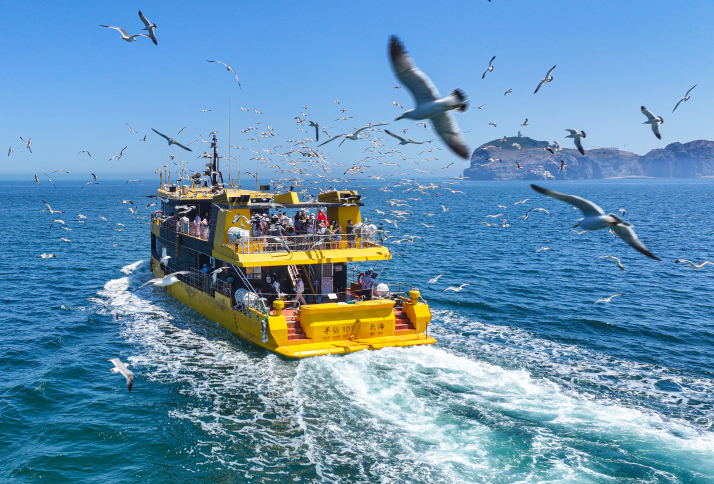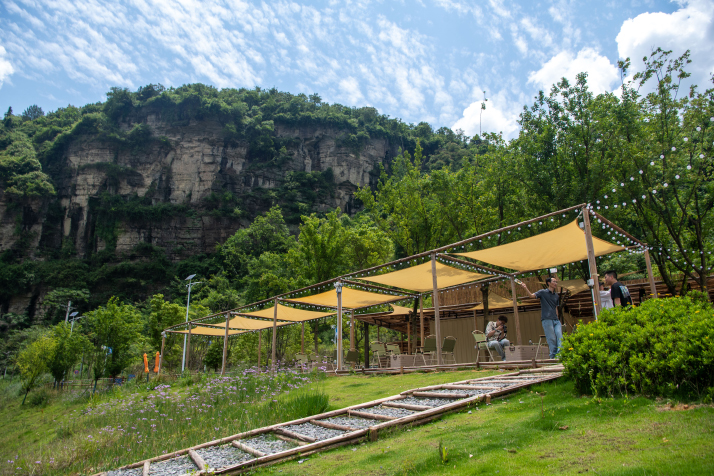| China |
| Heatwaves redraw China's summer consumption map | |
|
|
 Tourists take a boat ride near Hailu Island, Rongcheng City of Shandong Province, on June 23, enjoying the cool sea breeze and watching seagulls (XINHUA)
A relentless heatwave has gripped Beijing since early June, with temperatures sometimes exceeding 36 degrees Celsius (96.8 degrees Fahrenheit). The hot weather compelled Wang Shining, a Beijing resident, to take refuge elsewhere. She packed her bags and together with her husband traveled to the Chengde Mountain Resort in Hebei Province for some much-needed respite. "I just couldn't take the outdoor heat anymore—but I also don't want to stay cooped up indoors with the air conditioning on all day either," Wang told Beijing Review. "Now, at the resort, even daytime outings are bearable. We'll stay here for a week." Built during the Qing Dynasty (1644-1911), the Chengde Mountain Resort served as a seasonal retreat for China's imperial family, located 180 km northeast of Beijing. Its cooler climate—thanks to a higher elevation and the surrounding mountains—has made this UNESCO World Heritage Site an ideal summer refuge from the capital's stifling heat. "While touring here, I was truly struck by our ancestors' ingenuity—managing to stay cool without access to any modern equipment. Or perhaps I should say, you can tell just how desperate ancient people get when the heat becomes unbearable!" Wang said.  Tourists enjoy themselves at a cafe in Toudu Town, Nanshan District of Chongqing Municipality, on June 11. As temperatures rise, people seek shelter from the heat around nearby Jinfo Mountain (XINHUA)
National wave Amid the unfolding heatwave, travelers like Wang are flocking to cooler destinations, sparking a nationwide boom in summer getaway tourism. Summer resort attractions are gaining momentum, with online services platform Meituan Travel reporting a staggering 664-percent year-on-year increase in searches for "summer retreats" since mid-June. Travelers from the northern Beijing-Tianjin-Hebei region are showing particular interest in the vast grasslands of Inner Mongolia Autonomous Region, while tourists from the more southern regions are embracing water-based activities. Searches for the thrilling Gulong Gorge rafting experience in Qingyuan, Guangdong Province, jumped 143 percent week on week on June 29, while refreshing stream trekking adventures in Conghua, also in Guangdong, saw a 110-percent rise in popularity in the last week of June. This dramatic shift in travel patterns reveals how Chinese tourists are escaping from the sweltering heat. Tourists from the Yangtze River Delta region in east China and Sichuan-Chongqing area in west China are showing a strong penchant for "mountain retreats," with resort hotels and homestays in scenic mountain areas seeing surges in popularity. To attract heat-escaping tourists, scenic spots across China have been rolling out special offers and services with local characteristics. "We received many consultation requests from Beijingers looking to escape the heat. To tailor to their needs, we have re-arranged many classic tour routes, allowing visitors to enjoy entertainment during the coolest hours of the day, including horse riding and outdoor camping," Chen Xianhua, a Zhangjiakou-based tour guide, told Beijing Review. Zhangjiakou is a prefecture-level city in northwestern Hebei that co-hosted the 2022 Beijing Olympic Winter Games. Bordering Beijing, the city serves as a summer resort due to its cooler highland climate. In Chongqing Municipality, riverside restaurants now offer discounted chilled drinks and local snacks at their coveted "cooling seats" with waterfront views. Meanwhile, Longli Water Town in the south-central region of Guizhou Province has equipped its Guixiu Theater with holographic projections and mist-spraying cooling systems. "Theater-goers can now enjoy both artistic performances and instant relief from the heat," the theater's general manager Xu Liming told Xinhua News Agency. To further boost summer visitor numbers, the venue has partnered with travel agencies to launch "cooling shuttle buses" that connect high-speed rail stations and airports. "Next, we'll introduce combo tickets bundling homestays, evening performances and night tours for a complete summer escape experience," Xu added. Li Zhongguang, Deputy Director of the China Tourism Academy, told newspaper China Securities Journal that summer tourism must evolve "from selling landscapes to selling lifestyles." He emphasized that the sector's future lies in shifting from destination-based travel for external visitors to shared summer leisure experiences integrating both tourists and locals—a natural evolution in the era of culture-tourism convergence. "Scenic areas should leverage their cooling resources to meet the diverse demands of multi-tier consumer groups," Xin Benlu, a professor at Jilin University's School of Business and Management, told Xinhua. Diverse options Beyond modern summer tourism, people also draw inspiration from ancient cooling traditions, using specialized tools, seasonal foods and water-based activities to cool themselves down. Meituan's Summer Food Trend Report, released on June 24, showed that searches for "heat-relief foods" surged 36 times month on month nationwide since the start of June. Beijing, Shanghai, Shenzhen, Chengdu and Guangzhou emerged as the top cities for summer dining. Capitalizing on the summertime consumer craving for refreshment, health and a slim waistline, brands are rolling out next-gen cold beverages tailored to young adults. Bubble tea chain CoCo debuted a low-sugar mung bean milk slush—a smart pick given mung beans, in traditional Chinese medicine, are said to help regulate your body temperature and help you detoxify when temperatures soar. Bubble tea brands Naixue Tea and HeyTea have gone green this summer, with weight-conscious blends featuring kale, bitter melon, kiwifruit, cucumber and avocado—ingredients pitched as both hydrating and low in calories. Meanwhile, at tourist sites, cultural and creative ice creams dominate the edible souvenir scene. These designer ice creams, molded into landmark shapes like the roof ornaments of the ancient palaces in Beijing or the Terracotta Warriors, satisfy the customer need for instant cooling and Instagrammable cultural cred. Conventional cooling items are still hot. During the recent June 18 online shopping festival, a report released by e-commerce platform Pinduoduo revealed sales of air conditioners from Chinese electrical appliance brands Midea, Xiaomi and Haier had more than doubled month on month. Products such as sandals and quick-dry clothing also saw sales go up. In the scorching heat, consumers are demanding faster delivery of cooling products. A representative from Meituan Instant Retail told China Securities Journal that the platform has introduced dedicated express delivery services for summer time-related electronic goods, allowing customers to enjoy doorstep delivery within 30 minutes. Additionally, Meituan Instant Retail has partnered with appliance brands like Gree and Midea to offer same-day delivery and installation services, ensuring large appliances such as air conditioners can be installed and used immediately after purchase. "The booming summer economy is injecting great momentum into macroeconomic recovery. It offers consumers diverse options, from online shopping to outdoor experiences, reshaping the consumption market landscape and serving as a new engine for high-quality economic development," Wang Peng, an associate researcher at the Beijing Academy of Social Sciences, told newspaper International Business Daily. "Businesses should meet summer consumption demand by innovating products and services while actively expanding consumption scenarios, such as organizing heat-relief activities. In terms of channel development, companies should strengthen their online-offline integration to enhance consumer experiences and broaden sales reach," Wang Peng added. (Print Edition Title: Chasing the Chill and Thrill) Copyedited by Elsbeth van Paridon Comments to zhangyage@cicgamericas.com |
|
||||||||||||||||||||||||||||
|